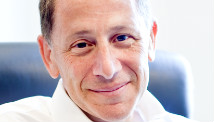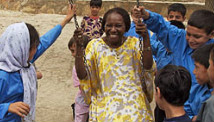STORY HIGHLIGHTS
- David Rothkopf: With this State of the Union speech, Obama returned to work of governing
- He says Obama's manner was confident, purposeful, sent message to fellow politicians
- He focused on economy, investing in Americans: jobs, energy, education, immigration
- Rothkopf: Obama remarks taking on gun lobby showed his new vigor as empowered advocate
Editor's note: David Rothkopf is CEO and editor-at-large of the FP Group, publishers of Foreign Policy magazine, and a visiting scholar at the Carnegie Endowment for International Peace.
(CNN) -- It is sometimes said of a great actor that he could hold an audience spellbound while reading a laundry list. This is essentially what President Obama tried to do on Tuesday night. As State of the Union addresses go, his was artless. It lacked inspired phrases or compelling narrative. Save for the energy he gave it at key moments, it was pedestrian.
It was also very important.
It was important because with it, Obama returned in earnest to the work of governing. Having won a clear victory in November, and having spent the intervening months putting out the wildfires our Congress likes to set, he delivered word Tuesday night that he had a clear and full agenda for his second term.

David Rothkopf
Candidate Obama, the man who has dominated American politics for most of the last five years, seems gone for good. That version of our president may have had more poetry about him. But this version wants to actually get down to governing.
Opinion roundup: How did Obama and Rubio do?
Whether he can or not remains to be seen. Indeed, it seems certain that many, if not most, of the goals he set on Tuesday night will elude him. But the speech was also important because it sent several clear messages to his fellow politicians.
He said, "I won. I am in charge. I will not shy away from a progressive agenda."
He said, "I know what I want. I'm not afraid of defeat as I was in the past. I will never run in another political campaign again."
Oh, he didn't say these things literally. You won't find those words in the transcript. But look at the tape -- you'll find them in his body language and between the lines of his speech.
The economy was his centerpiece -- but it was not just another campaign speech about growth. It was a speech about, as one of his team put it earlier in the day, "growing the economy from the middle out." He spoke about restoring the middle class and creating opportunity. From the beginning it was clear that this was no longer a speech about recovering from a crisis. It was not another speech about America at war. Obama's concern -- the crisis he was addressing -- was that incomes and job creation are stagnant even as the economy grows and corporate profits hit record levels.
His prescription was clear. We must invest in America and in its people. In infrastructure, domestic energy resources, cleaner energy and energy efficiency, education, research and building the workforce through immigration reform. Obama called for raising the minimum wage to help lift up the poorest and better reward those among them who are willing to work for a living. He also sounded the theme that we must do all these things to better compete in the global economy, citing the examples of China, Germany and others whose examples he said we should heed and exceed.
Even the portion of his speech that dealt with foreign policy was oriented to the domestic economy. Yes, he began with the newsworthy announcement that he would bring home half of all troops in Afghanistan by next year and end our war there the following year. Yes, he talked about defeating al Qaeda even as it shape-shifted its way around the world. And he addressed drone oversight, North Korea's nuclear test, Iran's nuclear program and the Middle East.
But many of his statements on these issues were formulaic. And the thrust of all of them -- even the boldest, like his return to his Prague promise of working to reduce nuclear stockpiles -- was enabling America to focus more energy on rebuilding its strength at home. Furthermore, perhaps the most important international thrusts had nothing to do with war at all. (His comments on cyberthreats, for example, were really directed at protecting intrusions against the private sector.)
Opinion: Obama dares Congress to get the job done
Obama's renewed focus on climate, including his call for "market-based" solutions -- meaning reopening the idea of carbon markets or other such mechanisms, a couple of years after such ideas were considered by many to be dead -- was a return to promises made long ago. It was also a recognition of the urgency with which this global threat must be addressed. His new secretary of state, John Kerry, was the leading voice in the Senate on these issues and has already told his staff how important these and other environmental concerns would be. This issue was raised early in the speech, even though it is clearly something requiring global cooperation. It was an important shift of emphasis.
Similarly, perhaps the biggest new foreign policy initiative Obama called for was opening of talks to achieve a trans-Atlantic trade agreement. This is a powerful idea that could be the centerpiece of second-term international economic policy. It would further enhance trade with the European Union, strengthen our Atlantic alliance and set the stage for its modernization in the 21st century, and open the way for a new global round of trade talks. And finally, since agricultural trade reform is so central to big emerging powers like Brazil and India, it would help strengthen our relations with them.
Of all the elements of the speech, however, the most compelling and emotional was Obama's concluding section demanding a vote on reforming America's gun laws. Citing gun deaths in his hometown, Chicago, with the victims of violence in the gallery watching him, he demonstrated his newfound confidence by standing up to one of the most powerful lobbies in Washington, tackling an issue he himself had sidestepped earlier in his presidency.
Opinion: In 2013, democracy talks back
At that moment of the speech -- calling for real change in the wake of tragedies like the school massacre in Newtown, Connecticut -- what we saw was a president in full, a man who knew his job, knew his power and was not afraid. He might or might not get the reforms he wanted. But he could certainly send a message to even his most obdurate opponents that he would use whatever tools and influence he had to demand they at least take a stand.
One can only hope he will do more, go past getting a vote to getting the results we need -- background checks, bans on assault weapons and high-volume magazines, mental health care reform, a real effort to stop gun trafficking. But whatever the outcome, at that moment Tuesday night, the focused energy of this president at this stage of his presidency reverberated through the rafters of the Capitol and suggested that this long speech was not a laundry list but a to-do list, an agenda for change offered up by a confident and empowered advocate.
Follow @CNNOpinion on Twitter.
Join us at Facebook/CNNOpinion.
The opinions expressed in this commentary are solely those of David Rothkopf.












